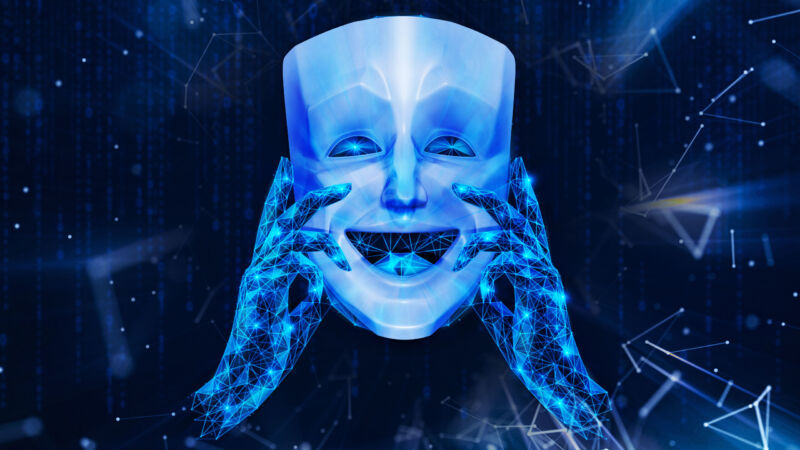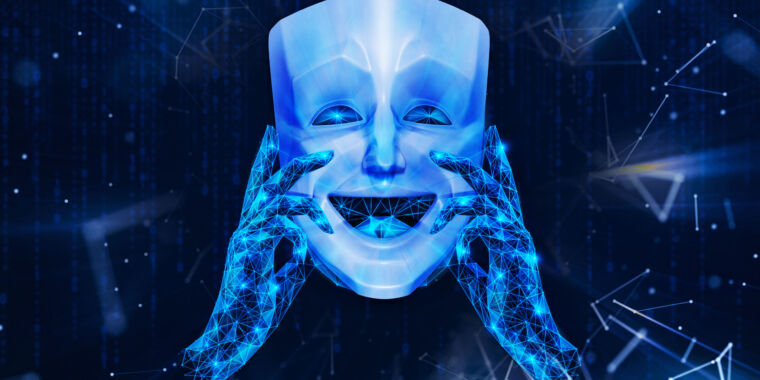Disarmingly lifelike: ChatGPT-4o will laugh at your jokes and your dumb hat

Enlarge / Oh you silly, silly human. Why are you so silly, you silly human?
Aurich Lawson | Getty Images
At this point, anyone with even a passing interest in AI is very familiar with the process of typing out messages to a chatbot and getting back long streams of text in response. Today’s announcement of ChatGPT-4o—which lets users converse with a chatbot using real-time audio and video—might seem like a mere lateral evolution of that basic interaction model.
After looking through over a dozen video demos OpenAI posted alongside today’s announcement, though, I think we’re on the verge of something more like a sea change in how we think of and work with large language models. While we don’t yet have access to ChatGPT-4o’s audio-visual features ourselves, the important non-verbal cues on display here—both from GPT-4o and from the users—make the chatbot instantly feel much more human. And I’m not sure the average user is fully ready for how they might feel about that.
It thinks it’s people
Take this video, where a newly expectant father looks to ChatGPT-4o for an opinion on a dad joke (“What do you call a giant pile of kittens? A meow-ntain!”). The old ChatGPT4 could easily type out the same responses of “Congrats on the upcoming addition to your family!” and “That’s perfectly hilarious. Definitely a top-tier dad joke.” But there’s much more impact to hearing GPT-4o give that same information in the video, complete with the gentle laughter and rising and falling vocal intonations of a lifelong friend.
Or look at this video, where GPT-4o finds itself reacting to images of an adorable white dog. The AI assistant immediately dips into that high-pitched, baby-talk-ish vocal register that will be instantly familiar to anyone who has encountered a cute pet for the first time. It’s a convincing demonstration of what xkcd’s Randall Munroe famously identified as the “You’re a kitty!” effect, and it goes a long way to convincing you that GPT-4o, too, is just like people.

Enlarge / Not quite the world’s saddest birthday party, but probably close…
Then there’s a demo of a staged birthday party, where GPT-4o sings the “Happy Birthday” song with some deadpan dramatic pauses, self-conscious laughter, and even lightly altered lyrics before descending into some sort of silly raspberry-mouth-noise gibberish. Even if the prospect of asking an AI assistant to sing “Happy Birthday” to you is a little depressing, the specific presentation of that song here is imbued with an endearing gentleness that doesn’t feel very mechanical.
As I watched through OpenAI’s GPT-4o demos this afternoon, I found myself unconsciously breaking into a grin over and over as I encountered new, surprising examples of its vocal capabilities. Whether it’s a stereotypical sportscaster voice or a sarcastic Aubrey Plaza impression, it’s all incredibly disarming, especially for those of us used to LLM interactions being akin to text conversations.
If these demos are at all indicative of ChatGPT-4o’s vocal capabilities, we’re going to see a whole new level of parasocial relationships developing between this AI assistant and its users. For years now, text-based chatbots have been exploiting human “cognitive glitches” to get people to believe they’re sentient. Add in the emotional component of GPT-4o’s accurate vocal tone shifts and wide swathes of the user base are liable to convince themselves that there’s actually a ghost in the machine.
See me, feel me, touch me, heal me
Beyond GPT-4o’s new non-verbal emotional register, the model’s speed of response also seems set to change the way we interact with chatbots. Reducing that response time gap from ChatGPT4’s two to three seconds down to GPT-4o’s claimed 320 milliseconds might not seem like much, but it’s a difference that adds up over time. You can see that difference in the real-time translation example, where the two conversants are able to carry on much more naturally because they don’t have to wait awkwardly between a sentence finishing and its translation beginning.
Disarmingly lifelike: ChatGPT-4o will laugh at your jokes and your dumb hat Read More »
